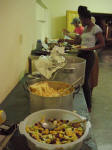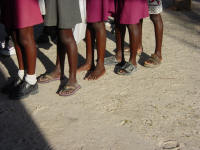|
Thanksgiving
“At last the rain came. It was sudden and tremendous. For two or three moons the sun had been gathering strength till it seemed to breathe a breath of fire on the earth. All the grass had long been scorched brown, and the sand felt like live coals to the feet…the world lay panting under the live, vibrating heat. And then came the clap of thunder. It was an angry, metallic and thirsty clap, unlike the deep and liquid rumbling of the rainy season. A mighty wind rose and filled the air with dust. Palm trees swayed as the wind combed their leaves into flying crests like strange and fantastic coiffure. When the rain finally came, it was in large, solid drops of frozen water. The earth quickly came to life…A vague scent of life and green vegetation was diffused in the air. As the rain began to fall more soberly and in smaller liquid drops, children sought for shelter, and all were happy, refreshed and thankful.” Omege
On Thursday morning, Thanksgiving, we left our permanent site at Ekulo to return to our training site. The principal took us to Omuthiya where we met up with Pat, the other Peace Corps trainee near us. Then we got into a Combi, a van/bus thing that operates like a taxi. The general rule around here is just when you think the taxi is filled to capacity, the driver will cram at least two more people in it. You pay the driver per person, so the more people he crams inside, the more economical it is for him. He took us all the way to Ondangwa – about 90km, that took about 1hr 15min so it’s not a bad trip. From there we got a car taxi to take us to the Rural Development Center, where we all met up for Thanksgiving. It was very exciting to hear about everybody’s permanent site. Someone passed around a map and we put little dots all over it, marking our sites so we can come visit each other. Zac and I are going to establish the Arcaro Rest Camp at the gateway to Etosha. Thanksgiving was the first significant holiday away from home so everyone got incredibly drunk. We cooked a big Thanksgiving dinner in the kitchen at RDC. Everybody was starving because Namibians just don’t eat as much as we do. People literally had piles of food on their plate. It was a very emotionally charged day for many. Everyone got mail from home, that was brought up from Windhoek. Many people in the group have girlfriends/boyfriends back home, so the stress of being away is building up. Plus, the week at our permanent sites was the first time we’ve all been separated from each other for so long. Zac and I are really lucky to be married in the Peace Corps. It’s definitely the way to go. I think for the next two years I won’t even think about Thanksgiving or even remember the date. But for this year, it was nice to be together with everyone. It was kind of corny, and perhaps only occurred because everyone was so drunk, but we all held hands around the room and one of the volunteers said some words of thanks. Then various people stood up and toasted our families back home, the Peace Corps, Namibia, our group, the food, etc. I think that this year more than any before we all can fully realize how much we have to be thankful for. Here are some things you can better appreciate on our behalf for the next two years: a wide variety and availability of food, the closeness of family, school buses, air conditioning, electricity, running water, clean water, seat belts, spacious vehicles, an active and capable police force, safety, grass, schools, trees, cold water, ice, ice cream, popcorn, understanding what people are saying, knowing what is going on around you, gender equality, shoes. I don’t think I have written very much about the poverty here. It is an interesting poverty. People aren’t really homeless because they are resourceful enough to build huts out of the mahangu. People aren’t beggars because there is no one to beg from. Nobody is The crime rate in Oshakati is high because people are so desperate, and police are virtually non-existent. Where we are staying is very safe, because we are far from the city. But just by being “rich” white people, we are more likely to be targets. The VSO couple that we’re replacing at Ekulo were originally placed in Oshakati but they were robbed at gunpoint their first night at their location. When they went to the police station the next morning, the police basically said, “you’re lucky to be alive” and that was all. No investigation, no support. The police are understaffed, under trained, and under funded. One of the little constant reminders of the poverty here is the You can learn a lot about a culture from the language. In Oshindonga, the word for “year” and “rain” is the same-because the rains only come once a year. The word for mother (meme) is the same word for woman, and aunt. This reflects their idea of extended family. Every woman is your mother and every man (tate) is your father. Then there are suspicious similarities between words. For example, the words for “peace”, “cheap”, and “beer” are all very similar. So are the words for “white person”, “goat” and “prostitute”. You can also tell what things are new to the society because they don’t have their own word, but rather take the English word and put an “o” in front. Examples: obreakfast, ocomputer, otelephone, omacaroni. Love,
|

 footprints in the sand. When we walk to our school, we are following the paths through the sand that the school children take. Looking at the ground, most of the prints are of bare feet with little toes, few are of shoes. In the classrooms I don’t notice as much because I don’t look at their feet, I don’t even think about it. But the sand reminds me. I never even think about it when I put my shoes on, but it’s the simplest things.
footprints in the sand. When we walk to our school, we are following the paths through the sand that the school children take. Looking at the ground, most of the prints are of bare feet with little toes, few are of shoes. In the classrooms I don’t notice as much because I don’t look at their feet, I don’t even think about it. But the sand reminds me. I never even think about it when I put my shoes on, but it’s the simplest things.